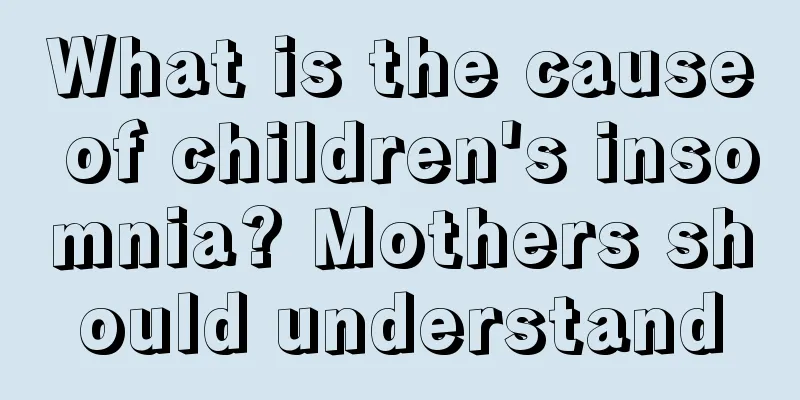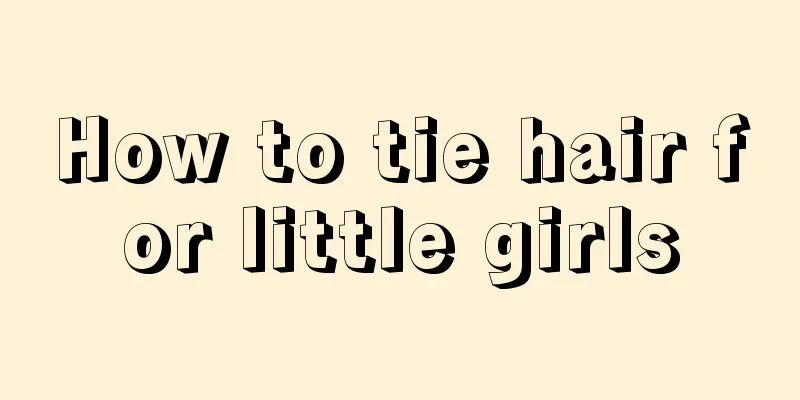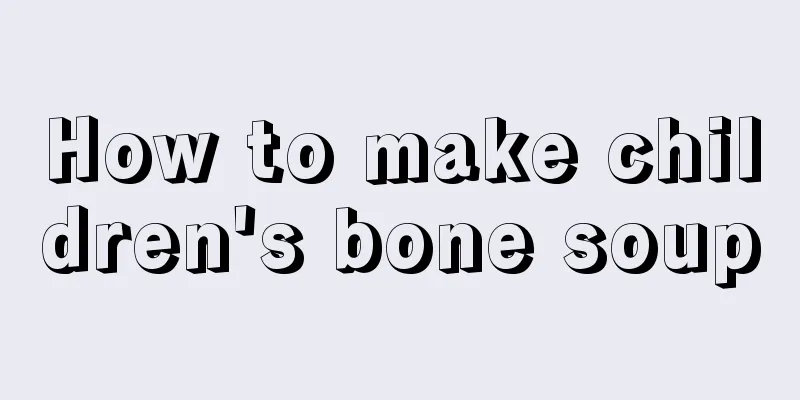What is the cause of children's insomnia? Mothers should understand

|
Generally speaking, children will not suffer from insomnia. If they do suffer from insomnia, we must pay attention to it. Poor sleeping methods, fear of sleeping, environmental factors and physiological factors are the main causes of insomnia in children. When a child suffers from insomnia, we must find the cause and treat it accordingly. The main causes of insomnia in children are: Bad sleeping methods: Young children’s difficulty falling asleep is often related to parents’ incorrect parenting methods, such as holding the child and waiting for him/her to fall asleep before putting him/her in bed, sleeping with the child (sleeping with the child), etc. There is a clear relationship between young children's difficulty falling asleep and insecure attachment. Sleep terrors: Children between the ages of 4 and 12 may be afraid of the night, and their parents are often unaware of this. Some children confuse "sleep" with "death" and believe that they will die if they fall asleep. Hence the fear of sleep. Environmental factors: noisy sleeping environment, bright lights, excessive heat or cold indoor environment, high humidity, uncomfortable bed, crowded room, and high study pressure can all affect falling asleep. Physiological factors: being too hungry, too full, and physical discomfort can cause difficulty falling asleep. Sleep rhythm disorder: After children go to school, they study for too long at night, and their original sleep-wake rhythm is disrupted. In addition, consuming stimulant foods or drinks such as tea, coffee, Coca-Cola, chocolate, and taking central nervous system stimulants will affect falling asleep and cause sleep disorders. Insomnia includes three forms: difficulty falling asleep, increased awakenings during sleep, and early awakenings. Infants and school-age children often experience difficulty falling asleep and/or waking up during sleep, while adolescents may experience the coexistence of all three forms. The treatment of insomnia in children generally does not recommend giving children sleeping pills, but instead focuses on lifestyle adjustments and psychological comfort. Treatment measures include the following: Improve bad parenting methods: Let children develop good sleeping habits, go to bed only when they are sleepy, do not lie in bed for too long, do not sleep with your child, and tell fewer or no stories before bedtime. Improve the sleeping environment: ensure that the sleeping environment is quiet and warm, and the indoor temperature is moderate, with 25 degrees Celsius being the ideal. Try to turn off the lights when you sleep. It is very important to develop regular sleeping habits. Appropriate physical activities: Physical activities can not only relieve study fatigue, but also improve sleep and even treat insomnia. Psychotherapy: Provide care and comfort to children with insomnia, explain the causes of insomnia to them, and explain that insomnia is not terrible and can be cured; eliminate the factors that induce insomnia and preach knowledge of sleep hygiene; this supportive psychotherapy can help insomniacs let go of their psychological burdens and promote sleep. Relaxation therapy: This method can be used for older children. Relax skeletal muscles throughout the body. The specific method is: the exerciser lies quietly and first adjusts the breathing, trying to make the breathing deeper and slower naturally rather than artificially, while relaxing the muscles in various parts of the body. You can imagine a quiet and relaxing scene in your mind so that your mind and body can relax simultaneously. Doing relaxation exercises before going to bed can reduce the level of wakefulness, shorten the latency period to fall asleep, and improve sleep. It works better with children and teenagers who can understand the whole relaxation process. Drug treatment: For those whose severe insomnia affects their study and life, they can use drugs such as diazepam under the guidance of a doctor to improve the tension and anxiety caused by insomnia. Diet therapy: This method is very beneficial for the treatment of insomnia in children. 1. Ginseng and jujube syrup: 100 grams of salvia miltiorrhiza and 100 grams of fried jujube kernels. Grind them into fine powder, take 5g each time with sugar water, twice a day, the second time is best taken before going to bed. One course of treatment is 10 days. 2. Gastrodia elata tea: 5 grams of Gastrodia elata, sliced, brewed with boiling water, once a day, it has a good effect in treating juvenile disease. 3. Sleep-aiding chicken soup: stir-fried Chinese jujube seeds and salvia miltiorrhiza 10 grams each, oyster, pinellia, sophora flavescens 15 grams each, calamus, selfheal 5 grams each, and cinnamon 5 grams. Wrap all the herbs in cloth and stew them with a whole hen. Eating meat and drinking soup have a good effect on stubborn insomnia in children and adolescents. |
<<: At what age can a baby learn to walk? New moms must know!
>>: Six most common causes of nosebleeds in children
Recommend
What skills should an eight-year-old boy learn?
Nowadays, parents enroll their children in specia...
At what age do boys' genitals develop?
Puberty is a gradual process. During this period,...
What is the cause of high lactic acid in newborns?
If the baby shows symptoms of high lactic acid, p...
What is the reason for children's teeth to turn black?
If children's teeth turn black or yellow, par...
Can a one year old eat peaches?
A one-year-old baby should have been weaned, and ...
What should I do if my baby has a fever and high blood count?
Blood count refers to the number of white blood c...
How to regulate the frequency of bowel movements of a 10-day-old newborn?
Newborns have just come into this world and are s...
11 The little girl's underwear is yellow
Nowadays, many parents will put diapers on their ...
What to do if your baby coughs badly at night
The baby's body resistance is relatively low,...
Why does my one-year-old baby keep crying?
The baby starts to develop after birth, and the e...
Can babies with urticaria take a bath?
Bathing is an activity that everyone does. It is ...
How to care for a baby with a high fever and cold hands and feet
Babies are the apple of their parents' eyes. ...
If your baby refuses to take medicine, parents should learn these little tricks to feed the medicine
I believe everyone knows that medicine is partial...
What should I do if my child has diarrhea after having a fever?
Disease is the biggest hidden danger and threat t...
Baby's face has coffee spots
In our lives, many people often have spots on the...









